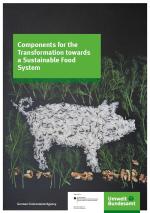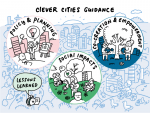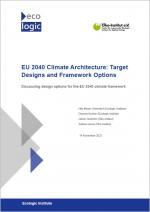Ecologic Institute Newsletter No 254 – November 2023
- Ecologic Institute Newsletter
Food, Agriculture and Climate at COP28 – and beyond – Policy Brief
As governments engage in final preparations for COP28 in Dubai, the United Arab Emirates (UAE) Presidency continues to prioritize its Food Systems and Agriculture Agenda. The aim to have governments at COP28 commit to integrating sustainable agriculture into their national climate agendas is welcome, timely and essential. However, this step needs to be part of a larger effort to modernize agricultural policy, particularly with respect to agricultural subsidies and the role of private sector collaboration. This policy brief highlights priority areas in moving from political declarations to concrete action.
Elements for the Transformation to a Sustainable Food System – Brochure
This brochure summarizes the key findings of the "Socio-ecological Transformation of the Food System" (STErn) project. It consolidates the action fields (1) promoting a more plant-based diet, (2) further development of organic agriculture and food industry, and (3) strengthening regional value chains into strategies, accompanied by specific policy recommendations.
CLEVER Cities Guidance – Online Platform
The CLEVER Cities Guidance was officially launched in September 2023 at the CLEVER Cities final conference. The online platform developed by Ecologic Institute features insights, tools, indicators, and lessons learned about nature-based solutions (NBS) emerging out of the CLEVER Cities project and its nine partner cities. Filling a gap in available resources, the Guidance focuses on (1) policy and planning strategies, (2) how to generate and measure social impacts of NBS, and (3) approaches for co-creation and engaging stakeholders. A range of engaging formats such as videos, guidance documents, testimonies, policy briefs, and infographics/illustrations are utilized to make the contents more accessible and exciting than ever before.
Nature-based Solutions for the EU – A look at ponds and ponded landscapes – Article
This analysis of 38 EU directives shows that despite support for nature-based solutions (NBS) in Natura 2000 sites, the majority of ponds and ponded landscapes fall outside these protection measures. The EU's emphasis on natural water retention and carbon-rich ecosystems often ignores the potential of ponds. This article illustrates that EU directives depend on the ambition of lower authorities and that formal recognition of ponds as an NBS measure is crucial for climate change mitigation.
Designing Greener Active Pharmaceutical Ingredients – Article
Learn about pioneering developments in the sustainability of pharmaceuticals with our latest article on greener active pharmaceutical ingredients (APIs). Gain insights from industry experts on developing greener APIs that reduce negative environmental impact. The findings highlight opportunities to integrate environmentally friendly criteria throughout the research and development process. Early consideration of environmental aspects combined with collaboration between R&D and environmental experts has the potential to shape a more sustainable future for pharmaceuticals.
EU 2040 Climate Architecture: Target Designs and Framework Options – Report
According to the EU Climate Law, the EU must adopt a climate target for 2040. This climate target is a critical milestone on the EU's path towards climate neutrality and net negative emissions. However, weak target designs and implementation frameworks undermine the EU's efforts to achieve climate neutrality. A new report by the Ecologic Institute and the Oeko-Institut provides an overview of design options for the climate target as well as the implementation framework and discusses how different reforms can enable the EU to reach the 2040 climate target.
Plastics Treaty Text Must Center Ecosystems – Article
In this letter printed in the journal Science, a group of scientists working on biodiversity and plastics – among them Doris Knoblauch from Ecologic Institute – argue that the future plastics treaty text must center ecosystems. This is because both ecosystems and biodiversity have not only to be restored but also protected from pollutants throughout the whole plastic life cycle.
Peatland Protection Database and Networking Opportunities for Peatland Protection Stakeholders in Germany – Webinar
Peatlands are important ecosystems and indispensable in the fight against climate change. On 11 October 2023, over 230 participants from research institutions, authorities, associations, foundations, engineering offices and agricultural businesses learned about the implementation of the National Peatland Protection Strategy and the services offered by the "MoorNet" networking project. Would you like to find out more? You can find the presentations and videos from the MoorNet event on our newly launched website. We also invite all German peatland protection stakeholders to contribute their projects or events.
Creating Enabling Conditions for Ecosystem Restoration – Speech
Ecosystem restoration is gaining momentum in science and policy as a process that can jointly tackle biodiversity loss, climate change and other societal challenges. The human and social dimensions of restoration projects, however, are often insufficiently considered. The German Federal Agency for Nature Conservation (BfN) hosted a workshop entitled "Making people part of ecosystem restoration in Europe" from 17 to 19 October 2023 to explore this topic. McKenna Davis held a keynote presentation on "Creating enabling conditions for ecosystem restoration: Tools and guidelines for local impact".
Introduction to Nature Based Solutions – Lecture
The 88th UNEP/UNESCO/BMUV International Short Course held at the TU Dresden focused on Nature-based Solutions (NBS) to emerging water challenges. The seminar featured several contributions over a period of three weeks, including a presentation from Gregory Fuchs and Dr. Benjamin Kupilas on the concept of NBS and relevant international and European policy frameworks for implementing NBS.
Plastics, Green Urban Environments and Local Climate Protection – Lecture
On 16 October 2023, Doris Knoblauch gave a lecture on "Plastics, green urban environments and local climate protection" as part of a postgraduate course, where 22 experts from ministries, authorities, municipalities, non-governmental organizations, and the industrial sector from low-income countries and emerging economies were present and exchanged ideas. The focus was on showing how the different aspects of the triple crisis – plastics pollution, biodiversity loss and climate change – are intertwined and reinforce each other, and what role cities could play in tackling this triple crisis.
Participation is Key – at the right time – Speeches
On the occasion of the 10th Anniversary Edition of the European Urban Resilience Forum, Doris Knoblauch gave two presentations, showcasing insights won from both the CLEVER Cities project and the INTERLACE project. On 19 October 2023, she addressed the question of how the involvement of local communities in the co-creation of redevelopment restoration activities can contribute to building resilient cities with shared ownership. As a best practice example, she mentioned the Citizen Platforms Chemnitz, one of more than 250 good practice examples featured in the Urban Governance Atlas, which was developed as part of the INTERLACE project. On the following day, she was a speaker at the plenary panel "Scaling Up Nature-Based Solutions: Are We Ready to Unleash Nature's Full Potential?". The panel focused on whether effectively addressing the negative impacts of climate change requires a significant scaling up of nature-based solutions (NBS).
Shaping EU Climate and Energy Policy – Insights from and questions for the Ariadne project
In a three-day series of events in Brussels from 5 to 7 December 2023, partners from the Kopernikus project Ariadne present important findings from their work that are relevant for the further development of EU climate and energy policies. They will discuss these with representatives from political institutions, academia, civil society, and business. Participants can expect a varied program with workshops on current topics. We look forward to your registration.
Contents
- Publications
- Food, Agriculture and Climate at COP28 – and beyond – Policy Brief
- Elements for the Transformation to a Sustainable Food System – Brochure
- CLEVER Cities Guidance – Online Platform
- Nature-based Solutions for the EU – A look at ponds and ponded landscapes – Article
- Designing Greener Active Pharmaceutical Ingredients – Article
- EU 2040 Climate Architecture: Target Designs and Framework Options – Report
- Plastics Treaty Text Must Center Ecosystems – Article
- Recent: Events and Presentations
- Peatland Protection Database and Networking Opportunities for Peatland Protection Stakeholders in Germany – Webinar
- Creating Enabling Conditions for Ecosystem Restoration – Speech
- Introduction to Nature Based Solutions – Lecture
- Plastics, Green Urban Environments and Local Climate Protection – Lecture
- Participation is Key – at the right time – Speeches
- Register now!
- Shaping EU Climate and Energy Policy – Insights from and questions for the Ariadne project




